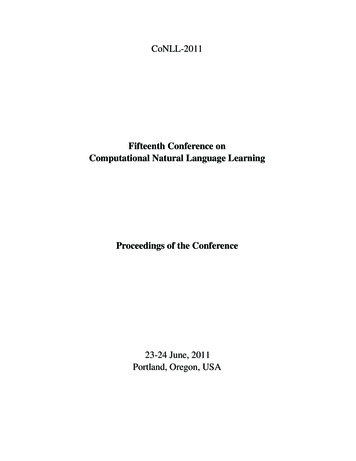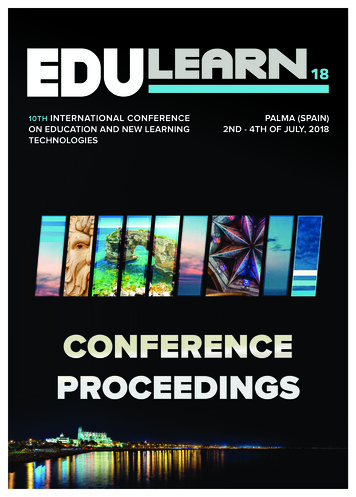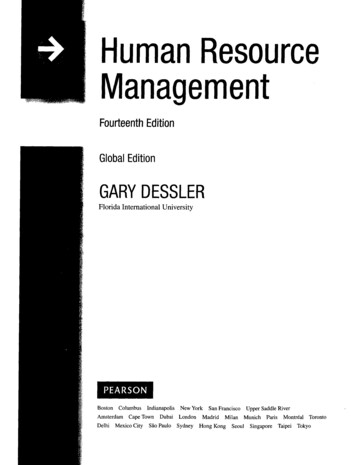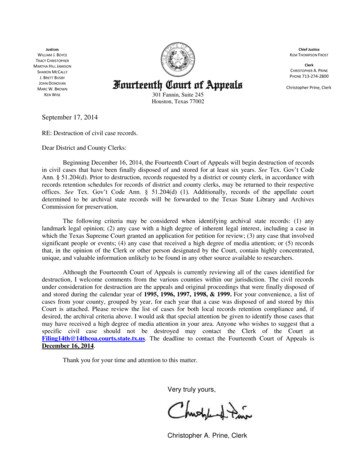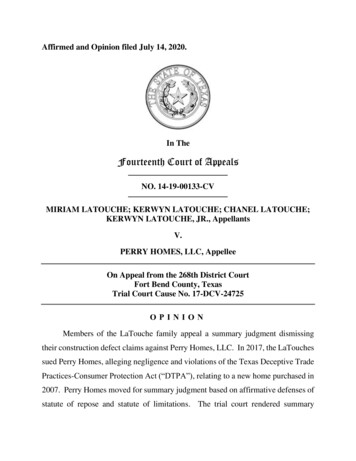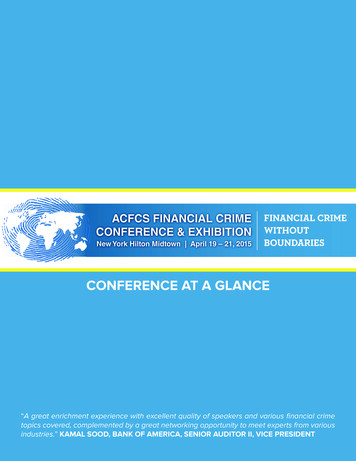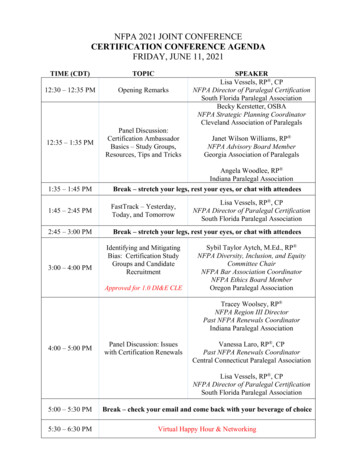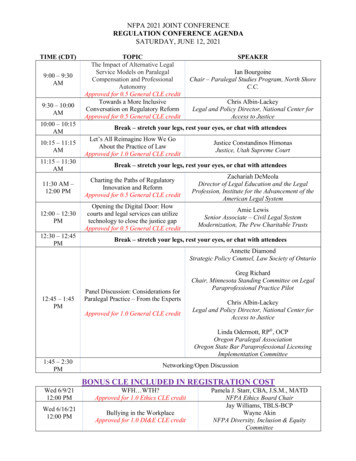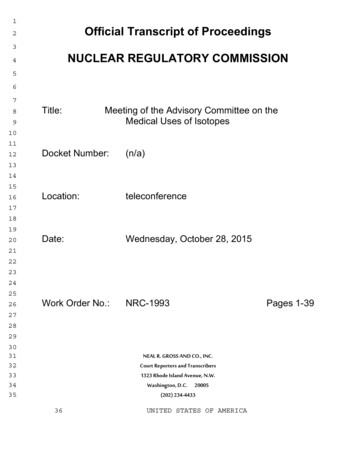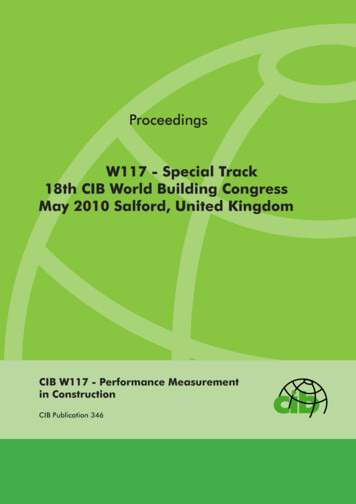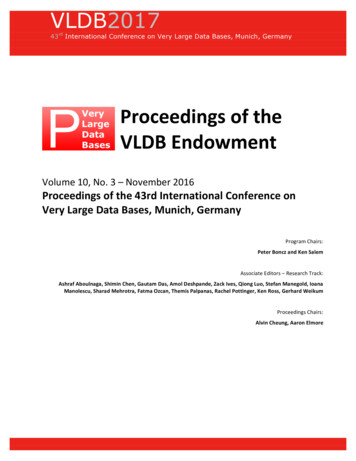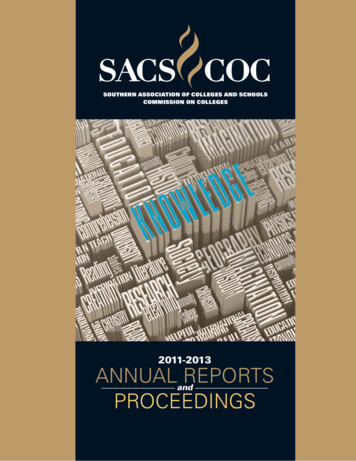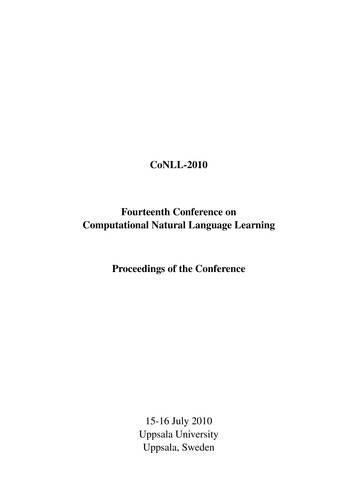
Transcription
CoNLL-2010Fourteenth Conference onComputational Natural Language LearningProceedings of the Conference15-16 July 2010Uppsala UniversityUppsala, Sweden
Production and Manufacturing byTaberg Media Group ABBox 94, 562 02 TabergSwedenCoNLL-2010 Best Paper Sponsors:c 2010 The Association for Computational LinguisticsOrder copies of this and other ACL proceedings from:Association for Computational Linguistics (ACL)209 N. Eighth StreetStroudsburg, PA 18360USATel: 1-570-476-8006Fax: 1-570-476-0860acl@aclweb.orgISBN 978-1-932432-83-1 / 1-932432-83-3ii
IntroductionThe 2010 Conference on Computational Natural Language Learning is the fourteenth in the series ofannual meetings organized by SIGNLL, the ACL special interest group on natural language learning.CONLL-2010 will be held in Uppsala, Sweden, 15-16 July 2010, in conjunction with ACL.For our special focus this year in the main session of CoNLL, we invited papers relating to grammarinduction, from a machine learning, natural language engineering and cognitive perspective. Wereceived 99 submissions on these and other relevant topics, of which 18 were eventually withdrawn. Ofthe remaining 81 papers, 12 were selected to appear in the conference programme as oral presentations,and 13 were chosen as posters. All accepted papers appear here in the proceedings. Following the ACL2010 policy we allowed an extra page in the camera ready paper for authors to incorporate reviewercomments, so each accepted paper was allowed to have nine pages plus any number of pages containingonly bibliographic references.As in previous years, CoNLL-2010 has a shared task, Learning to detect hedges and their scope innatural language text. The Shared Task papers are collected into an accompanying volume of CoNLL2010.First and foremost, we would like to thank the authors who submitted their work to CoNLL-2010. Weare grateful to our invited speakers, Lillian Lee and Zoubin Ghahramani, who graciously agreed to givetalks at CoNLL. Special thanks to the SIGNLL board members, Lluı́s Màrquez and Joakim Nivre, fortheir valuable advice and assistance each step of the way, and Erik Tjong Kim Sang, who acted as theinformation officer and maintained the CoNLL-2010 web page.We also appreciate the help we received from the ACL programme chairs, especially Stephen Clark. Thehelp of the ACL 2010 publication chairs, Jing-Shin Chang and Philipp Koehn, technical support by RichGerber from softconf.com, as well as input from Priscilla Rasmussen was invaluable in producing theseproceedings.Finally, many thanks to Google for sponsoring the best paper award at CoNLL-2010.We hope you enjoy the conference!Mirella Lapata and Anoop SarkarCoNLL 2010 Conference Chairsiii
Program ChairsMirella Lapata (University of Edinburgh, United Kingdom)Anoop Sarkar (Simon Fraser University, Canada)Program Committee:Steven Abney (University of Michigan, United States)Eneko Agirre (University of the Basque Country, Spain)Afra Alishahi (Saarland University, Germany)Jason Baldridge (The University of Texas at Austin, United States)Tim Baldwin (University of Melbourne, Australia)Regina Barzilay (Massachusetts Institute of Technology, United States)Phil Blunsom (University of Oxford, United Kingdom)Thorsten Brants (Google Inc., United States)Chris Brew (Ohio State University, United States)Nicola Cancedda (Xerox Research Centre Europe, France)Yunbo Cao (Microsoft Research Asia, China)Xavier Carreras (Technical University of Catalonia, Spain)Ming-Wei Chang (University of Illinois at Urbana-Champaign, United States)Colin Cherry (National Research Council, Canada)Massimiliano Ciaramita (Google Research, Switzerland)Alexander Clark (Royal Holloway, University of London, United Kingdom)James Clarke (University of Illinois at Urbana-Champaign, United States)Walter Daelemans (University of Antwerp, Netherlands)Vera Demberg (University of Edinburgh, United Kingdom)Amit Dubey (University of Edinburgh, United Kingdom)Chris Dyer (Carnegie Mellon University, United States)Jenny Finkel (Stanford University, United States)Radu Florian (IBM Watson Research Center, United States)Robert Frank (Yale University, United States)Michel Galley (Stanford University, United States)Yoav Goldberg (Ben Gurion University of the Negev, Israel)Cyril Goutte (National Research Council, Canada)Gholamreza Haffari (University of British Columbia, Canada)Keith Hall (Google Research, Switzerland)Marti Hearst (University of California at Berkeley, United States)James Henderson (University of Geneva, Switzerland)Julia Hockenmaier (University of Illinois at Urbana-Champaign, United States)Fei Huang (IBM Research, United States)Rebecca Hwa (University of Pittsburgh, United States)Richard Johansson (University of Trento, Italy)Mark Johnson (Macquarie University, Australia)Rohit Kate (The University of Texas at Austin, United States)Frank Keller (University of Edinburgh, United Kingdom)Philipp Koehn (University of Edinburgh, United Kingdom)Terry Koo (Massachusetts Institute of Technology, United States)v
Shankar Kumar (Google Inc., United States)Shalom Lappin (Kings College London, United Kingdom)Adam Lopez (University of Edinburgh, United Kingdom)Rob Malouf (San Diego State University, United States)Yuji Matsumoto (Nara Institute of Science and Technology, Japan)Takuya Matsuzaki (University of Tokyo, Japan)Ryan McDonald (Google Inc., United States)Paola Merlo (University of Geneva, Switzerland)Haitao Mi (Institute of Computing Technology, Chinese Academy of Sciences, China)Yusuke Miyao (University of Tokyo, Japan)Raymond Mooney (University of Texas at Austin, United States)Alessandro Moschitti (University of Trento, Italy)Gabriele Musillo (FBK-IRST, Italy)Mark-Jan Nederhof (University of St Andrews, United Kingdom)Hwee Tou Ng (National University of Singapore, Singapore)Vincent Ng (University of Texas at Dallas, United States)Grace Ngai (Hong Kong Polytechnic University, China)Joakim Nivre (Uppsala University, Sweden)Franz Och (Google Inc., United States)Miles Osborne (University of Edinburgh, United Kingdom)Christopher Parisien (University of Toronto, Canada)Slav Petrov (Google Research, United States)Hoifung Poon (University of Washington, United States)David Powers (Flinders University of South Australia, Australia)Vasin Punyakanok (BBN Technologies, United States)Chris Quirk (Microsoft Research, United States)Lev Ratinov (University of Illinois at Urbana-Champaign, United States)Roi Reichart (The Hebrew University, Israel)Sebastian Riedel (University of Massachusetts, United States)Ellen Riloff (University of Utah, United States)Brian Roark (Oregon Health & Science University, United States)Dan Roth (University of Illinois at Urbana-Champaign, United States)William Sakas (Hunter College, United States)William Schuler (The Ohio State University, United States)Sabine Schulte im Walde (University of Stuttgart, Germany)Libin Shen (BBN Technologies, United States)Benjamin Snyder (Massachusetts Institute of Technology, United States)Richard Sproat (Oregon Health & Science University, United States)Mark Steedman (University of Edinburgh, United Kingdom)Jun Suzuki (NTT Communication Science Laboratories, Japan)Hiroya Takamura (Tokyo Institute of Technology, Japan)Ivan Titov (Saarland University, Germany)Kristina Toutanova (Microsoft Research, United States)Antal van den Bosch (Tilburg University, Netherlands)Peng Xu (Google Inc., United States)Charles Yang (University of Pennsylvania, United States)Daniel Zeman (Charles University in Prague, Czech Republic)Luke Zettlemoyer (University of Washington at Seattle, United States)vi
Invited Speakers:Zoubin Ghahramani, University of Cambridge and Carnegie Mellon UniversityLillian Lee, Cornell Universityvii
Table of ContentsImprovements in Unsupervised Co-Occurrence Based ParsingChristian Hänig . . . . . . . . . . . . . . . . . . . . . . . . . . . . . . . . . . . . . . . . . . . . . . . . . . . . . . . . . . . . . . . . . . . . . . . . . . 1Viterbi Training Improves Unsupervised Dependency ParsingValentin I. Spitkovsky, Hiyan Alshawi, Daniel Jurafsky and Christopher D. Manning . . . . . . . . . . . 9Driving Semantic Parsing from the World’s ResponseJames Clarke, Dan Goldwasser, Ming-Wei Chang and Dan Roth . . . . . . . . . . . . . . . . . . . . . . . . . . . . . 18Efficient, Correct, Unsupervised Learning for Context-Sensitive LanguagesAlexander Clark . . . . . . . . . . . . . . . . . . . . . . . . . . . . . . . . . . . . . . . . . . . . . . . . . . . . . . . . . . . . . . . . . . . . . . . . 28Identifying Patterns for Unsupervised Grammar InductionJesús Santamarı́a and Lourdes Araujo . . . . . . . . . . . . . . . . . . . . . . . . . . . . . . . . . . . . . . . . . . . . . . . . . . . . . 38Learning Better Monolingual Models with Unannotated Bilingual TextDavid Burkett, Slav Petrov, John Blitzer and Dan Klein . . . . . . . . . . . . . . . . . . . . . . . . . . . . . . . . . . . . . 46(Invited Talk) Clueless: Explorations in Unsupervised, Knowledge-Lean Extraction of Lexical-SemanticInformationLillian Lee . . . . . . . . . . . . . . . . . . . . . . . . . . . . . . . . . . . . . . . . . . . . . . . . . . . . . . . . . . . . . . . . . . . . . . . . . . . . . 55(Invited Talk) Bayesian Hidden Markov Models and ExtensionsZoubin Ghahramani . . . . . . . . . . . . . . . . . . . . . . . . . . . . . . . . . . . . . . . . . . . . . . . . . . . . . . . . . . . . . . . . . . . . . 56Improved Unsupervised POS Induction Using Intrinsic Clustering Quality and a Zipfian ConstraintRoi Reichart, Raanan Fattal and Ari Rappoport . . . . . . . . . . . . . . . . . . . . . . . . . . . . . . . . . . . . . . . . . . . . 57Syntactic and Semantic Structure for Opinion Expression DetectionRichard Johansson and Alessandro Moschitti . . . . . . . . . . . . . . . . . . . . . . . . . . . . . . . . . . . . . . . . . . . . . . 67Type Level Clustering Evaluation: New Measures and a POS Induction Case StudyRoi Reichart, Omri Abend and Ari Rappoport . . . . . . . . . . . . . . . . . . . . . . . . . . . . . . . . . . . . . . . . . . . . . 77Recession Segmentation: Simpler Online Word Segmentation Using Limited ResourcesConstantine Lignos and Charles Yang . . . . . . . . . . . . . . . . . . . . . . . . . . . . . . . . . . . . . . . . . . . . . . . . . . . . . 88Computing Optimal Alignments for the IBM-3 Translation ModelThomas Schoenemann . . . . . . . . . . . . . . . . . . . . . . . . . . . . . . . . . . . . . . . . . . . . . . . . . . . . . . . . . . . . . . . . . . 98Semi-Supervised Recognition of Sarcasm in Twitter and AmazonDmitry Davidov, Oren Tsur and Ari Rappoport . . . . . . . . . . . . . . . . . . . . . . . . . . . . . . . . . . . . . . . . . . . 107Learning Probabilistic Synchronous CFGs for Phrase-Based TranslationMarkos Mylonakis and Khalil Sima’an . . . . . . . . . . . . . . . . . . . . . . . . . . . . . . . . . . . . . . . . . . . . . . . . . . 117A Semi-Supervised Batch-Mode Active Learning Strategy for Improved Statistical Machine TranslationSankaranarayanan Ananthakrishnan, Rohit Prasad, David Stallard and Prem Natarajan . . . . . . . 126Improving Word Alignment by Semi-Supervised EnsembleShujian Huang, Kangxi Li, Xinyu Dai and Jiajun Chen . . . . . . . . . . . . . . . . . . . . . . . . . . . . . . . . . . . . 135ix
A Comparative Study of Bayesian Models for Unsupervised Sentiment DetectionChenghua Lin, Yulan He and Richard Everson . . . . . . . . . . . . . . . . . . . . . . . . . . . . . . . . . . . . . . . . . . . . 144A Hybrid Approach to Emotional Sentence Polarity and Intensity ClassificationJorge Carrillo de Albornoz, Laura Plaza and Pablo Gervás . . . . . . . . . . . . . . . . . . . . . . . . . . . . . . . . . 153Cross-Caption Coreference Resolution for Automatic Image UnderstandingMicah Hodosh, Peter Young, Cyrus Rashtchian and Julia Hockenmaier . . . . . . . . . . . . . . . . . . . . . 162Improved Natural Language Learning via Variance-Regularization Support Vector MachinesShane Bergsma, Dekang Lin and Dale Schuurmans . . . . . . . . . . . . . . . . . . . . . . . . . . . . . . . . . . . . . . . 172Online Entropy-Based Model of Lexical Category AcquisitionGrzegorz Chrupała and Afra Alishahi . . . . . . . . . . . . . . . . . . . . . . . . . . . . . . . . . . . . . . . . . . . . . . . . . . . . 182Tagging and Linking Web Forum PostsSu Nam Kim, Li Wang and Timothy Baldwin . . . . . . . . . . . . . . . . . . . . . . . . . . . . . . . . . . . . . . . . . . . . 192Joint Entity and Relation Extraction Using Card-Pyramid ParsingRohit Kate and Raymond Mooney . . . . . . . . . . . . . . . . . . . . . . . . . . . . . . . . . . . . . . . . . . . . . . . . . . . . . . . 203Distributed Asynchronous Online Learning for Natural Language ProcessingKevin Gimpel, Dipanjan Das and Noah A. Smith . . . . . . . . . . . . . . . . . . . . . . . . . . . . . . . . . . . . . . . . . 213On Reverse Feature Engineering of Syntactic Tree KernelsDaniele Pighin and Alessandro Moschitti . . . . . . . . . . . . . . . . . . . . . . . . . . . . . . . . . . . . . . . . . . . . . . . . 223Inspecting the Structural Biases of Dependency Parsing AlgorithmsYoav Goldberg and Michael Elhadad . . . . . . . . . . . . . . . . . . . . . . . . . . . . . . . . . . . . . . . . . . . . . . . . . . . . 234x
Conference ProgramThursday, July 15, 20109:00–9:15Opening RemarksSession 1: Parsing (9:15–10:30)9:15–9:40Improvements in Unsupervised Co-Occurrence Based ParsingChristian Hänig9:40–10:05Viterbi Training Improves Unsupervised Dependency ParsingValentin I. Spitkovsky, Hiyan Alshawi, Daniel Jurafsky and Christopher D. Manning10:05–10:30Driving Semantic Parsing from the World’s ResponseJames Clarke, Dan Goldwasser, Ming-Wei Chang and Dan Roth10:30–11:00BreakSession 2: Grammar Induction (11:00–12:15)11:00–11:25Efficient, Correct, Unsupervised Learning for Context-Sensitive LanguagesAlexander Clark11:25–11:50Identifying Patterns for Unsupervised Grammar InductionJesús Santamarı́a and Lourdes
Richard Johansson (University of Trento, Italy) Mark Johnson (Macquarie University, Australia) Rohit Kate (The University of Texas at Austin, United States) Frank Keller (University of Edinburgh, United Kingdom) Philipp Koehn (University of Edinburgh, United Kingdom) Terry Koo (Massachusetts Institute of Technology, United States) v. Shankar Kumar (Google Inc., United States) Shalom Lappin .
